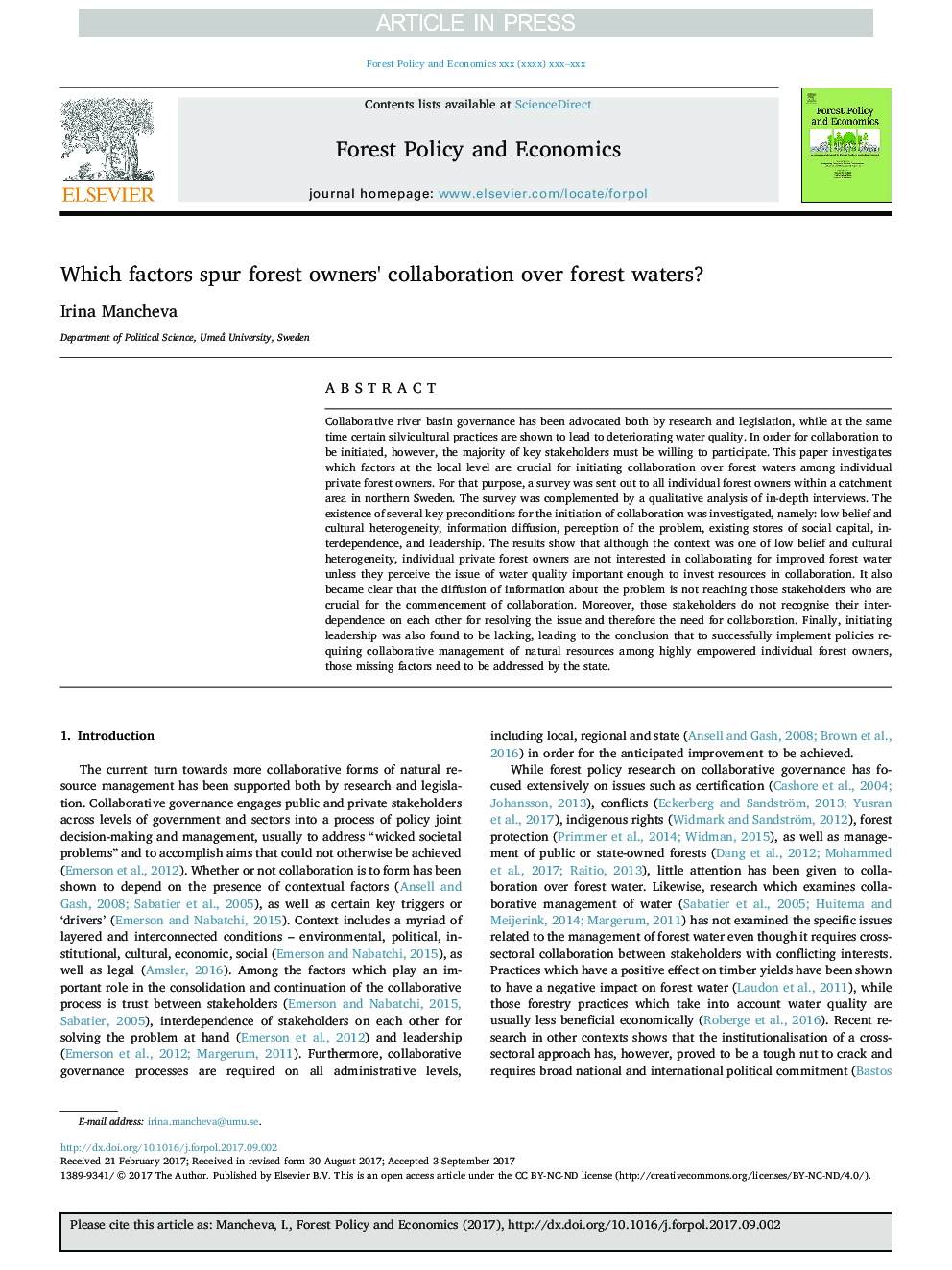| کد مقاله | کد نشریه | سال انتشار | مقاله انگلیسی | نسخه تمام متن |
|---|---|---|---|---|
| 6544758 | 1421647 | 2018 | 10 صفحه PDF | دانلود رایگان |
عنوان انگلیسی مقاله ISI
Which factors spur forest owners' collaboration over forest waters?
ترجمه فارسی عنوان
کدام عوامل همکاری صاحبان جنگل را بیش از آب های جنگل می کشند؟
دانلود مقاله + سفارش ترجمه
دانلود مقاله ISI انگلیسی
رایگان برای ایرانیان
ترجمه چکیده
حاکمیت حوضه رودخانه همکاری شده است و از طریق تحقیقات و قوانین حمایت شده است، در حالی که برخی از روش های کشتزارهای معدنی مشخص شده است که منجر به کاهش کیفیت آب می شود. با این حال، برای شروع همکاری، اکثریت سهامداران اصلی باید مایل به شرکت باشند. این مقاله به بررسی عوامل تعیین کننده در سطح محلی برای ایجاد همکاری میان آب های جنگلی بین صاحبان جنگل خصوصی خصوصی می پردازد. برای این منظور، یک نظر سنجی برای همه صاحبان جنگل های فردی در یک منطقه حوضه در شمال سوئد ارسال شد. این بررسی توسط یک تحلیل کیفی مصاحبه عمیق تکمیل شد. وجود چندین پیش شرط کلیدی برای آغاز همکاری، از جمله: باور نادرست و ناهمگونی فرهنگی، انتشار اطلاعات، ادراک مشکل، فروشگاه های موجود سرمایه اجتماعی، وابستگی متقابل و رهبری، مورد بررسی قرار گرفت. نتایج نشان می دهد که با وجود اینکه این زمینه یکی از باور نادرست و ناهمگونی فرهنگی است، صاحبان جنگل خصوصی خصوصی علاقمند به همکاری برای بهبود آب های جنگلی نیستند، مگر اینکه کیفیت کیفیت آب را به اندازه کافی مهم برای سرمایه گذاری منابع در همکاری درک کنند. همچنین معلوم شد که انتشار اطلاعات در مورد مشکل به ذینفعانی که برای شروع همکاری ضروری هستند دسترسی ندارند. علاوه بر این، این ذینفعان وابستگی متقابل خود را به یکدیگر برای حل مسئله و در نتیجه نیاز به همکاری به رسمیت نمی شناسند. سرانجام، ابتکار رهبری نیز فاقد آن بود، و نتیجه گیری می کرد که برای پیاده سازی سیاست هایی که نیاز به مدیریت مشترک منابع طبیعی در میان صاحبان جنگل های دارای صاحب قدرت را دارد، باید این عوامل از دست رفته مورد توجه دولت قرار گیرد.
موضوعات مرتبط
علوم زیستی و بیوفناوری
علوم کشاورزی و بیولوژیک
جنگلداری
چکیده انگلیسی
Collaborative river basin governance has been advocated both by research and legislation, while at the same time certain silvicultural practices are shown to lead to deteriorating water quality. In order for collaboration to be initiated, however, the majority of key stakeholders must be willing to participate. This paper investigates which factors at the local level are crucial for initiating collaboration over forest waters among individual private forest owners. For that purpose, a survey was sent out to all individual forest owners within a catchment area in northern Sweden. The survey was complemented by a qualitative analysis of in-depth interviews. The existence of several key preconditions for the initiation of collaboration was investigated, namely: low belief and cultural heterogeneity, information diffusion, perception of the problem, existing stores of social capital, interdependence, and leadership. The results show that although the context was one of low belief and cultural heterogeneity, individual private forest owners are not interested in collaborating for improved forest water unless they perceive the issue of water quality important enough to invest resources in collaboration. It also became clear that the diffusion of information about the problem is not reaching those stakeholders who are crucial for the commencement of collaboration. Moreover, those stakeholders do not recognise their interdependence on each other for resolving the issue and therefore the need for collaboration. Finally, initiating leadership was also found to be lacking, leading to the conclusion that to successfully implement policies requiring collaborative management of natural resources among highly empowered individual forest owners, those missing factors need to be addressed by the state.
ناشر
Database: Elsevier - ScienceDirect (ساینس دایرکت)
Journal: Forest Policy and Economics - Volume 91, June 2018, Pages 54-63
Journal: Forest Policy and Economics - Volume 91, June 2018, Pages 54-63
نویسندگان
Irina Mancheva,
